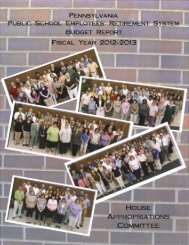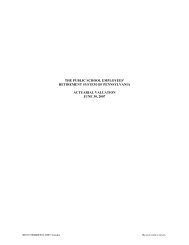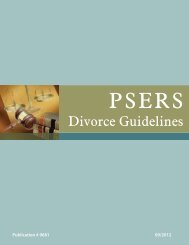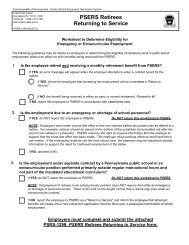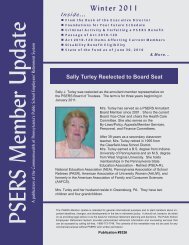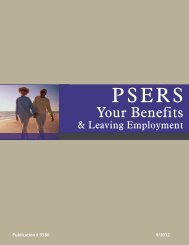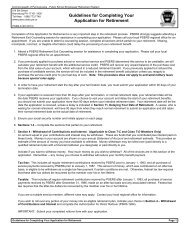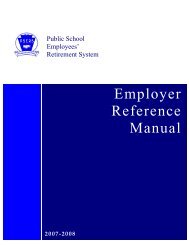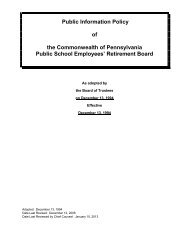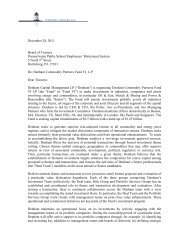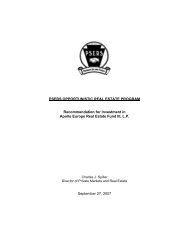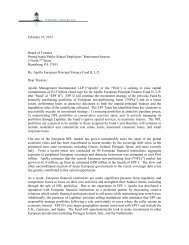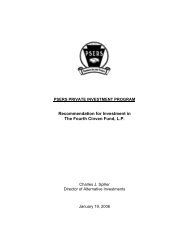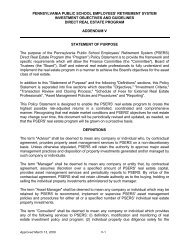a complete copy of the 2012 CAFR Report! - PSERs
a complete copy of the 2012 CAFR Report! - PSERs
a complete copy of the 2012 CAFR Report! - PSERs
You also want an ePaper? Increase the reach of your titles
YUMPU automatically turns print PDFs into web optimized ePapers that Google loves.
INTRODUCTORY SECTION<br />
Economic Summary<br />
Domestically, <strong>the</strong> equity markets incurred steep losses during <strong>the</strong> first quarter <strong>of</strong> <strong>the</strong> fiscal year partly due to a bitter<br />
and partisan U.S. debt ceiling debate. In <strong>the</strong> second quarter, <strong>the</strong> Federal Reserve announced <strong>the</strong> “Operation Twist”<br />
strategy (a plan to sell short-term notes and purchase long-term Treasuries to reduce interest rates), sparking a second<br />
quarter rally, while <strong>the</strong> third and fourth quarters <strong>of</strong> FY <strong>2012</strong> displayed signs <strong>of</strong> stabilization in <strong>the</strong> housing market.<br />
Internationally, <strong>the</strong> European debt crisis and <strong>the</strong> significant deceleration <strong>of</strong> growth in China negatively influenced<br />
<strong>the</strong> economy. Despite <strong>the</strong>se hurdles, PSERS FY <strong>2012</strong> investment return outperformed more than 85 percent <strong>of</strong> <strong>the</strong><br />
public pension plans in <strong>the</strong> Wilshire Compass All Public Funds Universe. For FY <strong>2012</strong> PSERS’ investment portfolio<br />
generated a rate <strong>of</strong> return <strong>of</strong> 3.43%, which resulted in $1.1 billion <strong>of</strong> net investment income. The total net assets <strong>of</strong><br />
<strong>the</strong> System decreased from $51.4 billion to $48.8 billion from July 1, 2011 to June 30, <strong>2012</strong>. The decrease was due to<br />
<strong>the</strong> deductions for benefits and administrative expenses exceeding net investment income plus member and employer<br />
contributions.<br />
The Board has continued to fulfill its mission to maintain stability and <strong>the</strong> long-term optimum value <strong>of</strong> <strong>the</strong> Fund.<br />
This is evidenced in <strong>the</strong> long-term growth <strong>of</strong> <strong>the</strong> System’s assets and <strong>the</strong> actuarial soundness <strong>of</strong> <strong>the</strong> Fund with respect<br />
to its funding status. The annualized rate <strong>of</strong> return for <strong>the</strong> twenty-five year period ended June 30, <strong>2012</strong> was 8.42%<br />
and exceeded <strong>the</strong> Fund’s long-term investment rate <strong>of</strong> return assumption during that time period. Of utmost importance<br />
to <strong>the</strong> Board is <strong>the</strong> assurance that <strong>the</strong> required reserves are available for payment <strong>of</strong> retirement benefits. PSERS<br />
has maintained its position among <strong>the</strong> top thirty largest pension systems in <strong>the</strong> nation.<br />
Major Initiatives<br />
Act 120 <strong>of</strong> 2010 Implementation Update<br />
Act 120 <strong>of</strong> 2010 included a series <strong>of</strong> actuarial and funding changes to PSERS as well as significant benefit changes<br />
for individuals who become new members on or after July 1, 2011. Implementation <strong>of</strong> <strong>the</strong> actuarial, funding and<br />
benefit changes in Act 120 <strong>of</strong> 2010 continued throughout <strong>the</strong> year. Highlights <strong>of</strong> <strong>the</strong> implementation follow:<br />
• The employer contribution rate caps defined in Act 120 <strong>of</strong> 2010 are in effect. These rate caps step up <strong>the</strong><br />
employer contribution rate in predictable increments and allow advance notice to <strong>the</strong> school employers and<br />
Commonwealth for budget planning purposes. The rate caps in Act 120 have had a dramatic impact on <strong>the</strong><br />
employer contribution rate. If Act 120 was not in effect, <strong>the</strong> employer rate would have jumped to 29.65% on<br />
July 1, <strong>2012</strong>, ra<strong>the</strong>r than <strong>the</strong> current rate <strong>of</strong> 12.36%. While this suppression <strong>of</strong> <strong>the</strong> employer contribution rate<br />
helps school employers and <strong>the</strong> Commonwealth budget for <strong>the</strong> increasing rates, <strong>the</strong> use <strong>of</strong> rate caps continues<br />
<strong>the</strong> underfunding <strong>of</strong> <strong>the</strong> System.<br />
• Over <strong>the</strong> past year PSERS’ documents, letters, forms, and most publications were updated to incorporate <strong>the</strong><br />
provisions <strong>of</strong> Act 120. This included changes in PSERS’ computer system to enable <strong>the</strong> new membership<br />
classes to receive member Statement <strong>of</strong> Accounts and staff prepared estimates. PSERS’ Member Web application<br />
was also revamped to enable <strong>the</strong>se new members to calculate <strong>the</strong>ir own retirement estimates.<br />
• The System also implemented an election process for <strong>the</strong> new membership Classes T-E and T-F. Of <strong>the</strong><br />
10,524 new members since July 1, 2011, 1,345 (12.78%) elected to be Class T-F with <strong>the</strong> 2.5% pension multiplier<br />
and higher contribution rate <strong>of</strong> 10.3%; whereas 9,179 (87.22%) elected to be Class T-E with a 2.0%<br />
pension multiplier and a contribution rate <strong>of</strong> 7.5%.<br />
While Act 120 <strong>of</strong> 2010 provided historic pension reform and made dramatic progress toward addressing funding<br />
issues at PSERS, difficult budget issues remain for both <strong>the</strong> Commonwealth and school employers. Discussions<br />
about additional pension reform are ongoing and PSERS continues to provide technical advice and information on<br />
<strong>the</strong> funding issue.<br />
Budgetary and Financial Governance<br />
PSERS submits its administrative budget request to <strong>the</strong> Governor’s Office <strong>of</strong> <strong>the</strong> Budget each October where it is<br />
reviewed and evaluated. Any changes proposed by <strong>the</strong> Governor’s Budget Office are made and a final amount is<br />
provided to <strong>the</strong> Legislature, which passes <strong>the</strong> final budget and submits it to <strong>the</strong> Governor for his signing into law. The<br />
administrative budget is not funded from <strong>the</strong> Commonwealth’s General Fund, ra<strong>the</strong>r from <strong>the</strong> earnings <strong>of</strong> <strong>the</strong> Fund<br />
itself. PSERS continues to be prudent in its use <strong>of</strong> funds and managing <strong>the</strong> annual budget.<br />
PAGE 7



